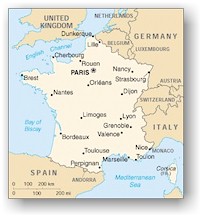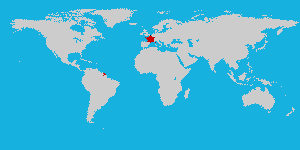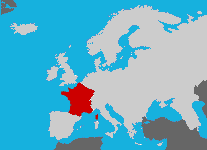Home
Destinations
France
Contributors
Concept
Guestbook |
 |
General Information
-
Official Name:
French Republic (République Française)
-
Usual Name:
France
-
Area:
211,153 sq. miles (about the size of Texas)
-
Capital City:
Paris
-
Nationality:
French
-
Languages:
-
French (official language)
-
Several declining regional languages (Basque, Occitan, Breton,
Alsacian, Corsican, etc.)
-
Population:
60,876,136 (July 2006 est.)
|
Destinations
Tourist Information
(by
David)
-
Visas:
One does not usually need a visa to stay in
France 90 days or less. But always double check with the French Embassy of
your own country to know the details.
-
Tourism:
France is the country that has the most foreign
tourists in the world, with about 50 millions a year.
-
Going places while there:
When in France, even if renting a car will give you more freedom, unless
you're planning on visiting remote places, I would advise against it as car
rentals are quite expensive and driving in France may be a scary experience
for some foreigners. Also,
public transportation is well developed and relatively cheap all over the
country, whether to go from one city to another or within a city.
-
Time Zone:
Western Europe Time zone (GMT+1, GMT+2
(daylight savings)).
-
Electricity:
220V.
-
Weights & Measures:
Metric system.
-
Currency:
Euro (€)
-
Coins:
1 cent, 2 cents, 5 cents, 10
cents, 20 cents, 50 cents, 1 €, 2 €.
-
Bills:
5 €, 10 €, 20 €, 50 €, 100 €, 200
€, 500 €. (200 and 500 Euro bills are extremely rare in France and not
accepted in every stores).
-
Credit and Payment Cards:
ATMs are
very common, easily found in cities and accept most international cards.
One can also pay with a card in most stores. Be careful though most of
them have a bottom limit of 5, 10 or even 15 Euros.
-
Basic Costs:
-
Food:
cheap: 5-15 €, medium range: 15-30 €, high end:
30 and more.
-
Lodging:
cheap: 30-40
€, medium range: 40-70 €, high end: 70 and more.
-
Legal Holidays:
On legal holidays all administrative buildings as well as almost businesses
are closed, so it's always a good idea to know them in advance. Museums and
tourist attractions stay open. Most holidays seem to be Catholic ones and
they used to be, but nowadays they have lost their religious dimension and
are just "stay at home" days for most French people.
-
New Year's Day:
January 1st.
-
Easter Monday:
the day after Easter (date will vary but stays in
March or April) .
-
Labor Day/May Day:
May 1st.
-
Armistice 1945:
May 8th.
-
Ascension:
40 days after Easter (usually in May)
-
Pentecost Monday:
Late May or early June. (note that this holiday has
recently been cancelled by the government, but this measure is unpopular
and a lot of people will still refuse to work on that day. It might or
might not be reestablished by a future government).
-
Fête Nationale:
July 14th.
-
Assumption Day:
August 15th.
-
All Saints Day:
November 1st.
-
Armistice 1918:
November 11th.
-
Christmas:
December 25th.
-
Other Important Days:
These holidays are not official (i.e. nothing is
closed on these days) but they are celebrated by all of some of the
population.
-
Chinese New Year:
Late January or early February. Mostly celebrated by
the Asian communities in France, it's been gaining in popularity these
past few years among the general population.
-
Mardi-gras :
in Februray (40 days before Easter). Nowadays
Mardi-Gras is celebrated mostly by kids and students, it's more or less
the French Halloween (people dress up and party). Parades are organized in
a few cities (the Nice carnival is not to be missed if you're in the
area).
-
Easter:
March or April. Easter has lost most of its
religious significance for most French people and nowadays it's a day to
gather with the family around a good meal (usually based on lamb). It's
more or less the French Thanksgiving now.
-
Mothers Day:
the last Sunday of May.
-
Fathers Day:
the third Sunday of June.
-
Halloween :
October 31st. In recent years Halloween appeared in
France, but as it's really not part of the culture, it never really took
on. Still, some kids and students celebreate it.
-
Christmas Eve:
December 24th. Christmas Eve is as important, or
even more, than Christmas itself, as it's usually on that night that the
family gathers around a traditional meal (usually turkey and sea food, but
this can vary). On will notice that the religious dimension is not
important and all non-religious people celebrate it as well as French
people from other religions than Christianism.
-
Saint Sylvester's Day (New Year's Eve) :
December. If Christmas is usually a family
gathering, New Year's Eve is most of the time celebrated with friends and
include a good dinner and some partying.
-
Tipping:
One thing one needs to know about
France (especially if you're American) is that service is always included.
Always. So no tipping. Ever. I insist on that because sometimes some waiters
who know how it's done in the US are gonna trick you into making you tipping
them. That being said, there is one exception, it is tourists guides. When
you visit a museum or a castle or something like this, and that there is a
"in-house" guide that shows you around, it is customary to tip him/her about
1 or 2 Euros. You can also tip taxi-drivers, but it's not compulsory.
Concerning restaurants, what French people usually do is that they'll leave
the change on the table after paying (well, depending on how much the change
is). In bars, it's extremely rare to tip, but it can happen. But remember;
you never have to.
-
Food:
What can I say about French food except that it's the best in the world? I
might be biased but I know many unbiased gourmets who think alike. Why do
you think almost all the words related to cuisine in English are indeed
French words (including "cuisine" and "gourmet" by the way). One other thing
about French food is that it's one of the most diverse in the world too.
Every city, every area, almost every village has its own local dishes and
specialties, to the point that I can't really describe French food as one
thing. So basically, when you're in France, try anything, whatever the way
it might look. And for the easily impressionable ones among you, just don't
ask "what's in it?" or "what is it made of?" and similar questions, just
taste and enjoy, otherwise you could just deprive yourself from some great
new taste you never even imagined before.
One note for vegetarians: if you're not hardcore about it, just stop being
for the time you're in France. If you're hardcore, you'll miss on a lot. And
what if you're vegan? I guess, you'll just starve and die of hunger in
France.
-
Alcohol:
There are very few rules about alcohol sale and
consumption in France, which does not mean you're allowed to be unruly when
you consume. Basically, the legal age is 18, but it's not enforced (nobody
ever gets their ID checked in a bar for example). And no, teenagers do not
get trashed every minute they can, it's actually really rare to drink (a
lot) when you're less than let's say 17. It's just that French people have a
very different approach to alcohol than Anglo-Saxons have. To summarize it,
one can say that for a French person, the quality and taste of what they
drink is more important than the effect it has one them. In other words,
most French people do not drink to get drunk, it's just a consequence of the
drinking, not the goal.
Still, this statement does not apply to anyone and any circumstance. You'll
find some binge drinking in France too (the people that practice it the most
are usually Rugby fans after a game, and university students on the
week-ends, in a quite different way than Anglo-Saxon students though).
-
Tobacco:
It is not true that every French person smokes. It is true though that until
a recent time, more than 50% of the population did so. But things are
changing, for the past 15 years, successive governments have been fighting
cigarette consumption (by various laws and by raising the prices more and
more) and it's finally showing some results. More and more people are
quitting, and even smokers that don't smoke less and start to respect
non-smokers.
-
Drugs :
In France, all illegal drugs are well.... illegal. A
few years ago, the government thought about maybe somewhat legalizing
marijuana use, but governments changed and that didn't happen. Today, one
can say that the use of marijuana won't land you in jail (still, you don't
want to smoke in the streets), but selling it will get you into trouble with
the law. The use and sale of other drugs is strictly punished though.


|